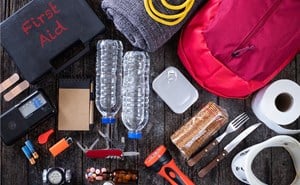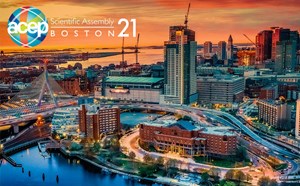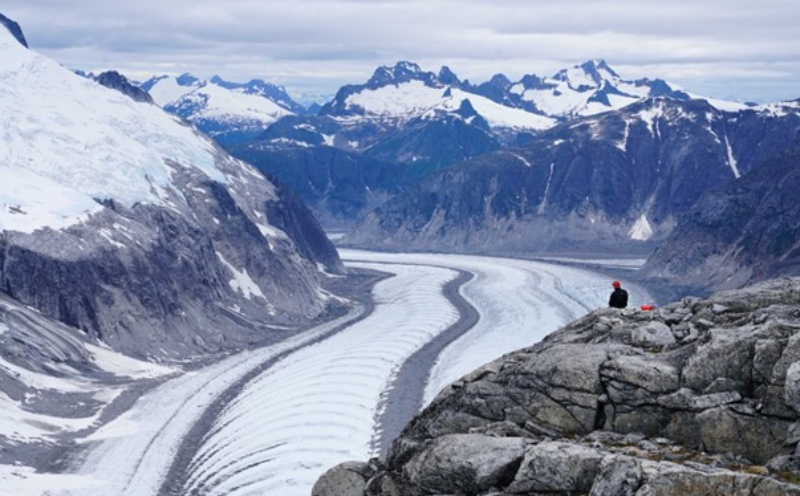
Wilderness Medicine Fellowship - My Moveable Feast
Andrew Park, DO, MPH, DiMM, FAWM
Dr. Andrew Park, one of the 2023-24 University of Vermont Wilderness Medicine Fellows, reflects on the sights, sounds, and smells of his year living in and treating patients in austere environments.
It’s like walking into the forest and leaving the city behind. Poet William Blake knew it: “Great things are done when men and mountains meet. This is not done by jostling in the street.” The branches of the pine tree have a way of wiping you clean of your past and present worries.

Navigating the ferns in the Pacific Northwest. (Andrew Park)
In many ways, my wilderness medicine fellowship has resembled a journey into a forest, where the process itself is the reward. Many years of studying and working inside sterile concrete walls without windows has made me feel like part of my life has passed me by without my knowledge, almost resentful. I’ve never been proud or thought it was healthy to be well-adjusted to a profoundly unnatural city life or work environment, especially the emergency department.
Although my ancestors settled in Vermont in the 1700s and their farms are still here, this was a new place for me. As a fellow, I work in emergency departments in Vermont and across Lake Champlain in northern New York. The ferry ride is brief, but a nice quiet before the chaos. One of the benefits of being an emergency physician in our current healthcare system is that we often do not have the time or empathetic bandwidth to fully explore the depth of our patients’ suffering. It would be too much. My patients remind me of the limited time I have in this place and have hastened my search for wholeness and authenticity, leading me out of the city and into the wilderness.
I started my fellowship in July in Alaska working as one of the expedition physicians for the Juneau Icefield Research Program (JIRP). Expedition medicine requires you to use your imagination and this whitewashed landscape on the icefields outside of Juneau was the perfect place. Fresh air. A clean palate.
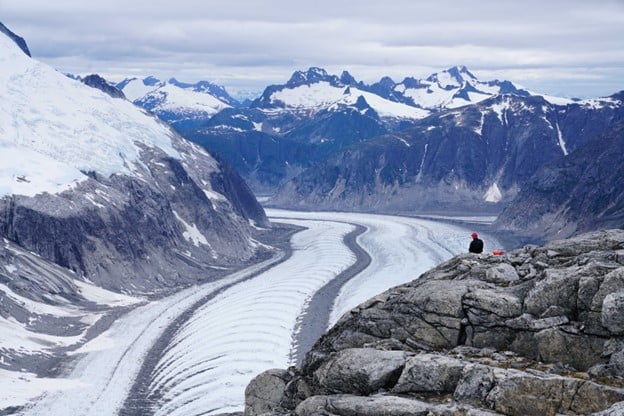
The glaciers, always moving. (Andrew Park)
Preparing for injuries that you hope will never happen, but are ready nonetheless. You are the person responsible for the medical needs of everyone present, including yourself. I slept lightly and kept my door open should someone ask for help in the middle of the night. As I’ve learned after years of practicing emergency medicine, anything is possible. Science and improvisation guides medicine in these remote areas with its amazing scenery. Truly wilderness medicine.
Sometimes wilderness medicine moves incrementally. The movement of the glaciers were measured in millimeters, as were the lacerations the research students sustained while smashing endless, empty bean cans after dinner. Bruised and blistered feet were thrown at me from all directions, and they wasted no time in doing so. Within an hour of my arrival I sat down in the dining room and as I picked up my fork, there it was, a hardly recognizable object being propped up by a student. It was a foot, dirty, smelly and poorly bandaged, hardly a bare piece of skin on it.
In December, my co-fellow and I joined the brotherhood of the rope on Mt. Orizaba, Mexico. All for one, one for all. There’s something special that happens when you trust another person with your life. However, in the tent, I was always happy to be alone. The howling wind doesn’t completely drown out the struggled, staccato breathing of my tentmate at high altitude and I have lost every ear plug to the recesses of my sleeping bag. The sound of my tentmate’s urine hitting the plastic of the improvised urinal at 3 am doesn’t help you go back to sleep. No one has a steady hand at that time of the night at high altitude. But these are the things we navigate when we’re on the margin.
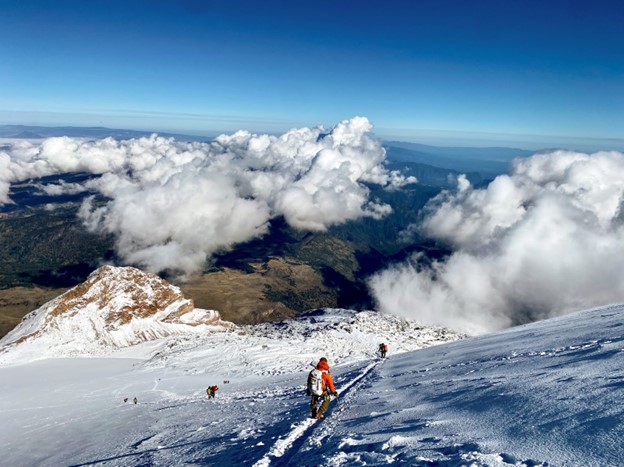
Mt. Orizaba with Wild Med Adventures. (Andrew Park)
In January, the high desert winds of the Aconcagua valley took every bit of anxiety from my body, and every bit of moisture as well. The words from ten nations infused the dining tent with excitement, apprehension, and constant thirst to know more about what lay ahead for them higher on the mountain. I never heard talk of politics or Zoom meetings, or of anything else one might concern themselves with in the city. The mountain has a way of reconciling the contradictions of daily life within so they become trivial in comparison to matters at hand.
When I did escape on an adventure, I never fully returned. When you submit yourself to the discipline that is necessary in remote areas of the world, the intense struggle leaves a mark and I am reluctant to give it up.
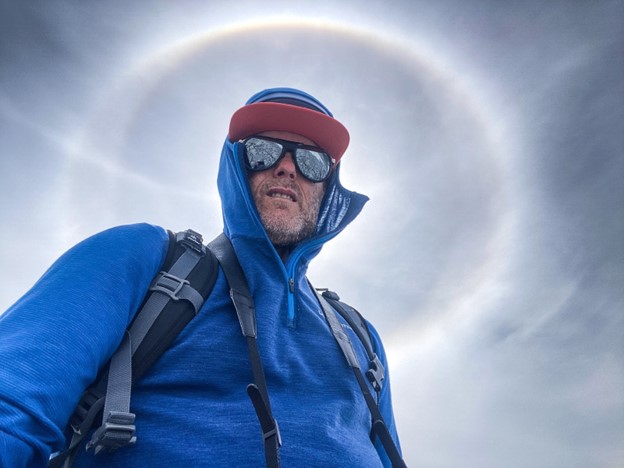
The sun hits differently on the glacier. (Andrew Park)
The city was especially hard to return to after an expedition. In January, I returned from an Argentinian summer to a very cold, but unusually snowless, Vermont. The asphalt was white, not from snow, but from crunchy rock salt. It was spread over the roadways and sidewalks, pulverized into a fine dust, staining the cold, hard surfaces. The commercial rock salt did little to make city life more palatable. Fortunately, in Vermont you don’t have to go far to find mountain trails to run.
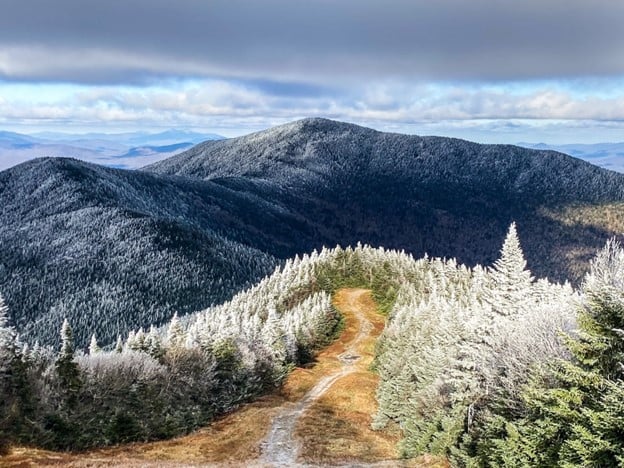
Madonna peak, Vermont. (Andrew Park)
Recording some of these experiences and sharing them with others has also been an important element of my fellowship. I’ve shared what I’ve learned through research and training with colleagues in emergency medicine, wilderness medicine, medical students, search and rescue, ski patrol, and the forestry service. I’ve written articles like this one, to put into words how I experience wilderness medicine and utilize it to broaden my skill set to become a better emergency physician while traveling the world.

Wilderness medicine scenarios in situ with the medical students at UVM. (Andrew Park)
The people though. This is what I’ll remember the most. My fellowship advisors and co-fellow. My new friends all over the world. This is just the start for us. We’ll go through difficult things in challenging environments and weave a strong web of connections that will grow with time and more experiences in the most remote places. I learned the word juntos (together) in Argentina. Life is enriched by difficulty. This was, in the words of Ernest Hemingway, my moveable feast. It will go with me for the rest of my life.

Dr. Sameer Sethi, my co-fellow, and I in Mexico. (Andrew Park)

Dr. Park is a wilderness medicine fellow at the University of Vermont. After growing up in western Kansas, he did his emergency medicine residency at St. Barnabas Hospital in The Bronx, NY. He is on the ACEP Environmental and Human Health Committee and the WMS Adventure Education Planning Committee. He manages a small forest property in the Pacific Northwest. His interests are expedition medicine, search and rescue, and exploring how wilderness medicine provides a way to be a leader and educator in a field that works to understand how to better interact in our communities locally and globally to promote individual and environmental health.
For more pictures from the year of fellowship check out @nomadskansascity


